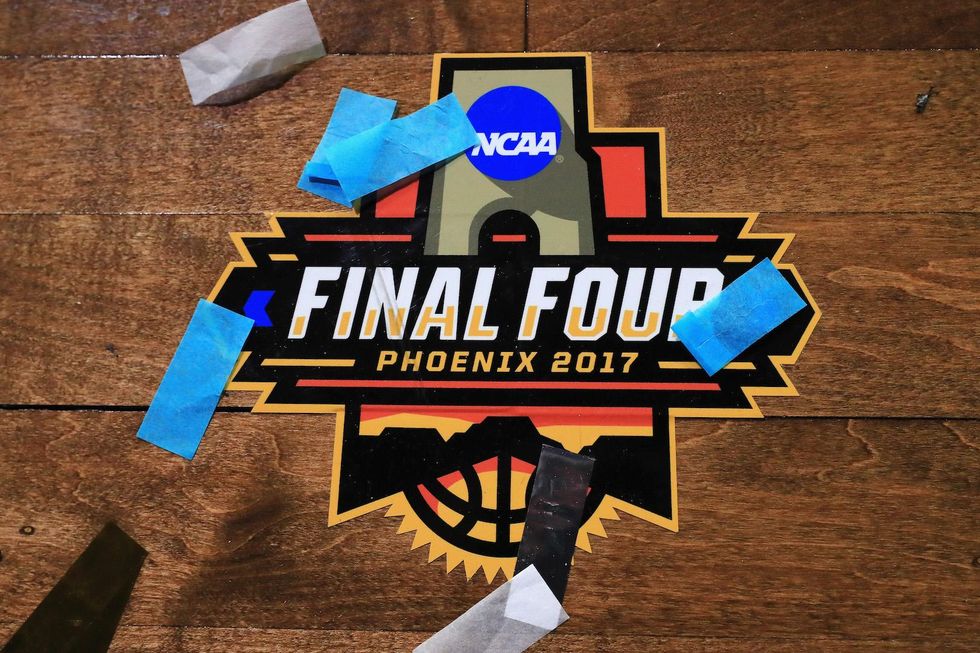
ESPN analyst Jay Williams said he thinks college basketball players should protest their unpaid status by boycotting the Final Four. (Ronald Martinez/Getty Images)

The FBI is investigating college basketball. The investigation has led to indictments, firings, suspensions, and leaks of wiretapped conversations that has the sports world up in arms about corruption in college sports.
As a result of that, ESPN analyst and former college and NBA star Jay Williams said he believes college basketball players should boycott the Final Four to protest the fact that they are unpaid. This, for more than one reason, is an ineffective and unthoughtful way to approach the issue.
“I agree. Players should boycott. But it’s how you boycott that’s going to be the major difference,” Williams said.
“You can essentially equate a scholarship to the salary cap of the NBA. They’re both businesses. Business goes across the board," he continued. "So as gross revenue increases, guess what happens in the NBA? The salary cap rises. As gross revenue increases in college sports, in particular college basketball, the scholarship stays exactly the same.”
“Wouldn’t it be a crazy thing if we didn’t just see players boycott a game in the NCAA Tournament, but boycott the Final Four?" he added. "Imagine how quickly the NCAA would recognize that this isn’t just a business for themselves, but also a business for the athletes as well. That’s how you make change.”
There are several issues with Williams’ call for scholarship college athletes to simply refuse to participate in the biggest games of their lives in hopes that they will start getting paid.
The NCAA, while often referred to as one big, cohesive organization that unilaterally makes rules, actually consists of hundreds of member universities that determine the rules themselves through a governing process. If enough schools decided they wanted their athletes to get paid, then athletes would get paid. Which also means the NCAA can't just decide on its own one day to start paying salaries to thousands of athletes.
Having worked in NCAA compliance for a major athletics program, I know that many student-athletes are more than happy with the arrangement that gives them a full-ride scholarship in exchange for playing sports. It’s inaccurate to paint this debate as if all student-athletes are struggling and demanding upheaval of the system.
The common trope of the "starving student-athlete" is also misleading, as full scholarship student-athletes not only get tuition, fees, books, room and board paid for, they also get more than enough food to ensure none of them is ever wondering where his or her next meal will come from.
The NCAA bears the brunt of the criticism for the amateur system of sports and the financial restrictions that system places on elite athletes, but it is the professional sports leagues that dictate that high school athletes be a year or more removed from high school before they can be eligible for the pros. That forces kids to college sports, because there aren’t any other good options.
So while it's true colleges don’t want to pay student-athletes as professionals, they also aren’t the ones that force professional level athletes to pretend they want to be college students. College basketball was just fine when players could go to the NBA straight out of high school and earn their market value.
The NBA’s “one-and-done” rule has led to high-level athletes going to school for one semester, receiving under-the-table payments, failing all their classes and then dropping out in the spring semester to prepare for the draft.
I don’t think college athletes need to get salaries for their participation, although I wouldn’t be mad if they did. I do, however, think they should be able to get endorsements, or get paid for appearances, or profit off of whatever else a free market can offer them.
But if you are frustrated with the corruption of major college athletics, don’t put the pressure on the kids to fix it. A majority of the student-athletes who will participate in the Final Four will not become NBA millionaires. Only a handful will get drafted. The rest deserve the chance to live their dreams out on the biggest stage they’ll ever see.
After the boycott, then what? If you just decide not to play in the Final Four without a plan, without a detailed alternative, without a specific proposal, all you're doing is violating the terms of your scholarship and missing out on a once-in-a-lifetime experience. Sure, you'll make the headlines for a while, but when the dust settles, what's left? What's different?
Jay Williams should put pressure on his former school, Duke University, to push for changes in NCAA legislation that would allow prominent student-athletes to profit from their name and likeness. Or he should lobby his former employer, the NBA, to allow qualified players to play in the league out of high school if teams want them (they do). Or, he should look in the mirror, as he and his network are among those profiting significantly off the efforts of college athletes.
It's easy to call for someone else to boycott when you've already had your college career, your Final Four, and your time in the spotlight. It's more difficult to attack the problem in ways less likely to grab headlines, but that will ultimately be much more realistic and effective.